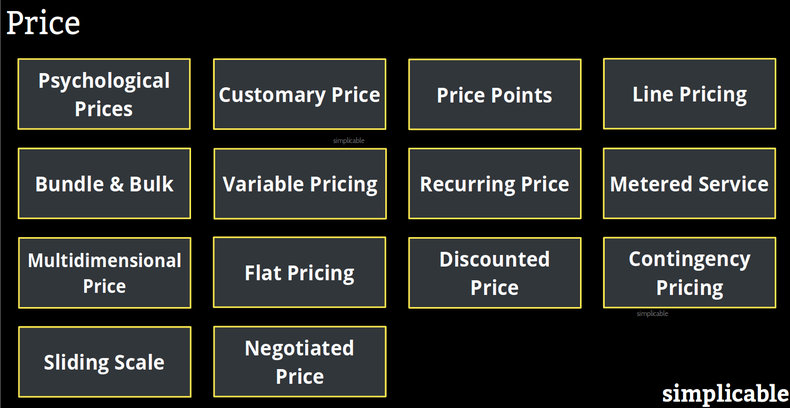

Psychological Prices
A price based on numerical cognition. Historically, prices such as $9.99 or $9.95 were believed to boost sales as they may be perceived as lower than $10. It is increasingly common for prices such as $10 to appear as this may be perceived as honest and fair.Customary Price
A customary price is a historically common price that remains in place for an extended period of time. Customers begin to expect customary prices. Any seller who raises a customary price may find that demand drops significantly. For example, if most of the vending machines in a nation charge $1 for a drink for more than 20 years, the first machines to charge $2 will face lower sales.Price Points
Price points are prices that are known to work in a particular industry. Any price beyond each price point causes a big drop in sales. For example, $9.99 for socks may sell 1 million units but $10.99 may sell 33,000 units. Sellers may experiment to find different price points that work.Line Pricing
Line pricing is a series of price categories for different levels of quality. For example, a clothing retailer may offer multiple styles of jeans at $29.99, $49.00 and $79.00. These are typically based on known price points. As such, it is common to confuse the two terms.Bundle & Bulk
Bundle prices tie multiple items together for a single price. Bulk prices are set by the amount purchased such that it is cheaper to buy more.Variable Pricing
Dynamic pricing designed to charge based on the customer's willingness to pay. For example, two passengers sitting beside each other on the same flight often payed a different price based on variables such as when they booked or how long they are staying at the destination.Recurring Price
A recurring price for a service such as a monthly fee for a streaming media service.Metered Service
A price based on usage such as an internet service that charges for bandwidth.Multidimensional Price
A price based on a formula that may include a fixed price plus a usage-based price. These may be designed to reflect the economics of the service being provided. In some cases, they are also designed to inflate prices by making terms too complex for customers to understand.Flat Pricing
A flat price is a single dimensional price that is offered to customers without any complex terms or exceptions. These are popular with customers, particularly in an industry that is known for complex billing practices. For example, an internet plan that offers a fibre connection for $50 a month with unmetered bandwidth.Discounted Price
A price that is lower than a previously offered price. Used to promote sales and clear inventory.Contingency Pricing
A price that is only paid if a result is achieved. Associated with legal fees.Sliding Scale
Fees based on ability to pay. Typically applies to public services such as education.Negotiated Price
Prices that are negotiated by the buyer. Common in some industries and cultures.| Overview: Price | ||
Type | ||
Definition | A fee charged for a product, service, asset or experience. | |
Related Concepts | ||


































